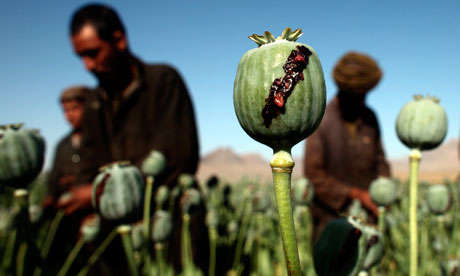Former presidents, prime ministers, eminent economists and leading members of the business community will unite behind a call for a shift in global drug policy. The Global Commission on Drug Policy will host a press conference at the Waldorf Astoria hotel in New York to launch a report that describes the drug war as a failure and calls for a "paradigm shift" in approaching the issue.
Those backing the call include Ernesto Zedillo, former president of Mexico; George Papandreou, former prime minister of Greece; César Gaviria, former president of Colombia; Kofi Annan, former UN secretary general; Fernando Henrique Cardoso, former president of Brazil; George Shultz, former US secretary of state; Javier Solana, former EU high representative; Virgin tycoon Richard Branson; and Paul Volcker, former chairman of the US Federal Reserve.
Envisioning a convivial post-corporate world requires a diversity of new/old concepts, policies, technologies, best practices, etc. that are imaginable or currently available for decentralized implementation.
This blog is intended to collate promising contributions to this vision from experts in many fields.
Participants are requested to classify each of their posts with one or more of the Category Labels (listed here).
June 05, 2011
Agroecology Outstrips Industrial Agriculture on Multiple Fronts
Reimagining Food Systems in the Midst of a Hunger Crisis
 |
| A majority of the world's hungry are women and children |
IPS
June 3, 2011
"Analysing the data from the 2006 study by region, the International Fund for Agricultural Development (IFAD) found that in some parts of Africa the yield increase (from agro-ecological practices) was a stunning 213 percent."
WASHINGTON, Jun 3, 2011 (IPS) - Today one billion people are living in hunger, not because of scarcity of production or a shortage of food on shelves in the global marketplace, but because they "lack the most basic purchasing power needed to acquire it", Olivier De Schutter, the United Nations Special Rapporteur on the Right to Food, said Thursday.
Currently, 35-40 percent of harvests are lost due to inadequate transportation and storage facilities, while a further 35-40 percent goes to wealthy Organization for Economic Cooperation and Development (OECD) countries.
According to experts like De Schutter, the inability of 10 percent of the world's population to feed itself is also a reflection of unsustainable patterns of consumption and deeply flawed models of industrialised agricultural production which, if allowed to continue, will divert 50 percent of global cereal harvests towards feeding cattle by the year 2050.
Subscribe to:
Posts (Atom)
